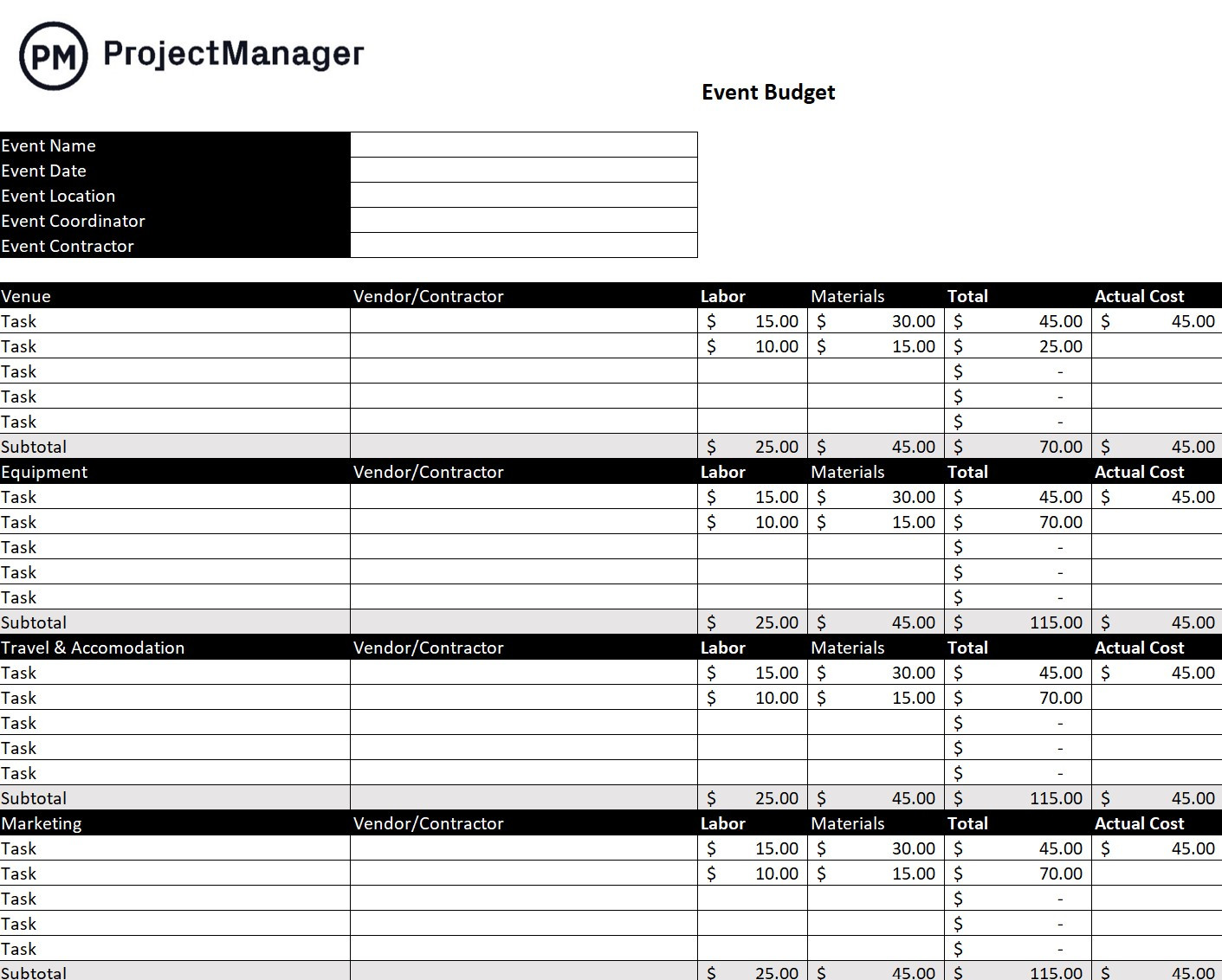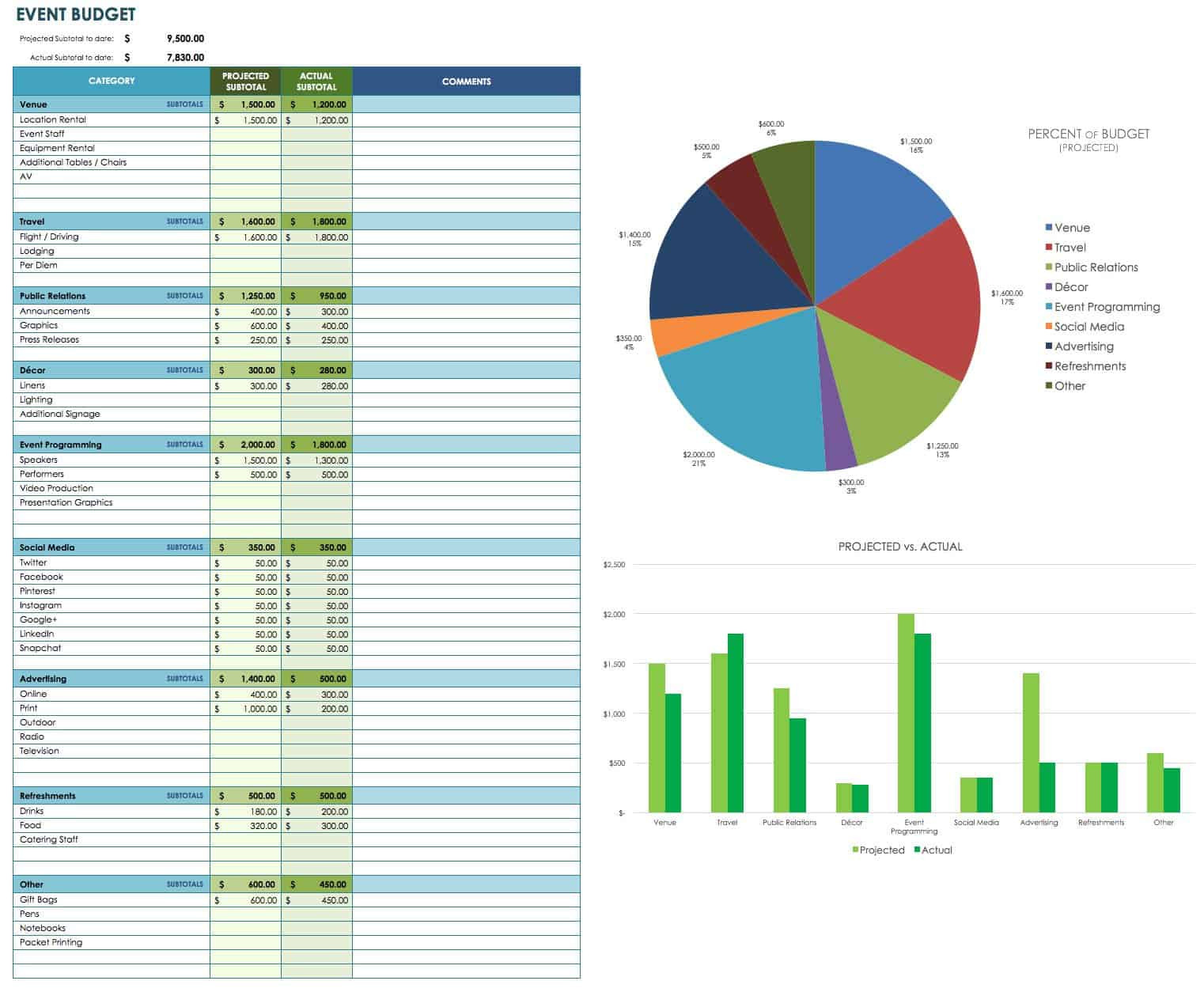Planning a non-profit event can be a rewarding experience, as it allows you to bring people together for a good cause. However, organizing such an event requires careful planning, including creating a budget to ensure that all expenses are covered. A non-profit event budget template is a valuable tool that can help you stay on track financially and ensure the success of your event.
What is a Non Profit Event Budget Template?
A non-profit event budget template is a document that outlines all the expenses and revenue associated with organizing a non-profit event. It helps you estimate how much money you will need to raise or allocate for the event and ensures that you stay within your financial limits. By using a budget template, you can track all expenses, such as venue rental, catering, decorations, marketing, and any other costs associated with the event.
The Purpose of a Non Profit Event Budget Template

Image Source: exceltemplates.net
The main purpose of a non-profit event budget template is to provide a clear overview of the financial aspects of organizing an event. It helps you plan and allocate funds efficiently, ensuring that all expenses are covered and that you do not overspend. Additionally, a budget template can help you identify areas where you can cut costs or reallocate funds to maximize the impact of your event. Ultimately, the goal of using a budget template is to ensure the financial success of your non-profit event.
Why Use a Non Profit Event Budget Template?
Creating a budget for a non-profit event can be a daunting task, especially if you are not familiar with financial planning. A non-profit event budget template provides a structured framework that can guide you through the process and help you stay organized. By using a budget template, you can easily track all expenses, monitor your revenue, and make informed decisions about where to allocate funds. This can ultimately help you achieve your fundraising goals and ensure the success of your event.
How to Create a Non Profit Event Budget Template

Image Source: gdoc.io
Creating a non-profit event budget template is a straightforward process that involves several key steps. First, you will need to gather information about all the expenses associated with the event, such as venue rental, catering, decorations, marketing, and any other costs. Next, you will need to estimate the revenue sources for the event, including ticket sales, sponsorships, donations, and grants. Once you have collected all the necessary information, you can use a budget template to organize and track your finances.
1. Start by outlining all expenses
When creating a non-profit event budget template, it is essential to start by outlining all the expenses associated with the event. This includes both fixed costs, such as venue rental and catering, as well as variable costs, such as decorations and marketing materials. By listing all expenses in detail, you can ensure that nothing is overlooked and that you have a clear understanding of where your money will be spent.
2. Estimate revenue sources

Image Source: whova.com
In addition to outlining expenses, it is crucial to estimate the revenue sources for your event. This may include ticket sales, sponsorships, donations, and grants. By estimating your revenue sources, you can determine how much money you need to raise or allocate to cover all expenses. This will help you set realistic fundraising goals and ensure that you have enough funds to support your event.
3. Track your finances
Once you have created a budget template and outlined all expenses and revenue sources, it is important to continuously track your finances throughout the planning process. This will help you stay on budget, identify any potential overspending or underfunding, and make adjustments as needed. By tracking your finances regularly, you can ensure that you are staying within your financial limits and that your event is on track to be a success.
4. Make adjustments as needed

Image Source: projectmanager.com
As you progress with planning your non-profit event, you may need to make adjustments to your budget template. This could involve reallocating funds from one expense category to another, cutting costs in certain areas, or seeking additional revenue sources. By being flexible and willing to make adjustments as needed, you can ensure that your event stays within budget and that you achieve your fundraising goals.
5. Seek feedback from stakeholders
Throughout the planning process, it can be beneficial to seek feedback from stakeholders, such as volunteers, donors, and event attendees. They may offer valuable insights and suggestions for improving your budget template and making your event more successful. By involving stakeholders in the planning process, you can ensure that your budget template reflects the needs and expectations of all parties involved.
6. Review and evaluate after the event

Image Source: fliplet.com
After your non-profit event has concluded, it is important to review and evaluate your budget template to determine its effectiveness. This involves comparing your actual expenses and revenue to your initial estimates, identifying any discrepancies, and analyzing what worked well and what could be improved for future events. By conducting a thorough review and evaluation, you can learn from your experience and make adjustments to your budget template for future events.
7. Use a template for future events
Once you have created a non-profit event budget template for one event, you can use it as a template for future events. By saving a copy of your budget template and making any necessary updates or adjustments, you can streamline the planning process for future events and ensure that you have a structured framework to guide you through the financial aspects of organizing a non-profit event.
8. Stay organized and informed

Image Source: whova.com
Throughout the planning process, it is essential to stay organized and informed about all aspects of your event budget. This includes regularly updating your budget template, tracking your finances, seeking feedback from stakeholders, and reviewing and evaluating your budget after the event. By staying organized and informed, you can ensure that your event stays within budget, achieves its fundraising goals, and is a success.
Tips for Successful Non Profit Event Budgeting
Creating a budget for a non-profit event can be challenging, but with the right tools and strategies, you can ensure that your event is a financial success. Here are some tips for successful non-profit event budgeting:

Image Source: template.net
Set realistic fundraising goals. When creating a budget for your event, be sure to set realistic fundraising goals based on your estimated expenses and revenue sources.
Monitor your finances regularly. Keep track of your expenses and revenue throughout the planning process to ensure that you stay within budget.
Seek feedback from stakeholders. Involve volunteers, donors, and event attendees in the planning process to gather valuable insights and suggestions for improving your budget.
Be flexible and willing to make adjustments. If necessary, make adjustments to your budget template to accommodate changes in expenses or revenue sources.
Review and evaluate after the event. After your event has concluded, review your budget template and evaluate its effectiveness to learn from your experience and make improvements for future events.
Use a template for future events. Save a copy of your budget template and use it as a template for future events to streamline the planning process and ensure consistency in your financial planning.
Conclusion

Image Source: pinimg.com
In conclusion, a non-profit event budget template is a valuable tool that can help you plan, organize, and track the finances of your event. By creating a budget template, outlining all expenses and revenue sources, tracking your finances, seeking feedback from stakeholders, and staying organized and informed, you can ensure that your event stays within budget and achieves its fundraising goals. With the right tools and strategies, you can successfully plan and execute a non-profit event that makes a positive impact on your cause.

Image Source: template.net

Image Source: smartsheet.com